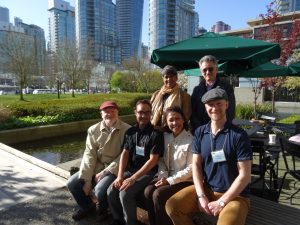Written by Joonas Plaan, TBTI PhD Candidate, Memorial University
Society for Applied Anthropology held its 76th annual meeting in Vancouver, BC at the end of March. The five-day program was full of interesting panels and presentations about applied anthropology and beyond. One of the big topics was related to small-scale fisheries, fishing people and fisheries regulations. TBTI researchers presented papers about their most recent work, including comparative studies about the importance of history in fisheries management, the small-scale fisheries guidelines, traditional ecological knowledge, understanding values of small-scale fisheries and community wellbeing, the importance of fish as food, market opportunities for small-scale fisheries, and an analysis of a new direct-sale regulation in Newfoundland and Labrador.
Since we were on the West coast, there were many panels about herring and salmon interactions with indigenous peoples. Several new studies show that herring and salmon are not important for the livelihood of coastal indigenous peoples but are, more importantly, a cultural keystone species. A number of presenters emphasized the importance of traditional ecological knowledge. All this is not new to researchers who have worked with indigenous peoples but SfAA conference showed that thanks to new methods, this knowledge is being used more and more by fisheries managers. Anthropologists and other social scientists no longer produce only ethnographies and ‘stories’ about communities they work with but have started to use various programs, such as Atlas.TI and MAXQDA, to integrate their results with data collected by marine biologists and other natural scientists. Social science studies are becoming clearly more trans-, and interdisciplinary, an approach embraced by TBTI as well..

Some of the TBTI members who attended SfAA (from left to right): Svein Jentoft, Rajib Bislaw (former MA student with TBTI), Moenieba Isaacs, Ratana Chuenpagdee, Jose Pascual and Derek Johnson.
The conference showed an important trend among applied anthropologists, which is to become, as they put it, “action anthropologists”. Presentations focusing on various coastal fisheries in North America showed how anthropologists have helped fishing communities to create better marketing opportunities and, in some cases, even have become leaders in direct-sale programs. These action anthropologists emphasize that our job is not only to study and publish but also to give back to the community we study, i.e., passing our experience to fishery dependent communities as we learn from them. Following this trend, TBTI has the “Great Fish for a Change” program that aims to work with fishing people and community organizations to develop ideas and recommendations about how to promote sustainable small-scale fisheries, including promotion of local fish consumption and direct fish sale.
Overall, SfAA conference showed that we do not learn about fishers and fisheries but we learn together with fishers about fisheries. Also, we kept hearing from various scholars, over and over again, that there is no point in doing research if it is not applied.















